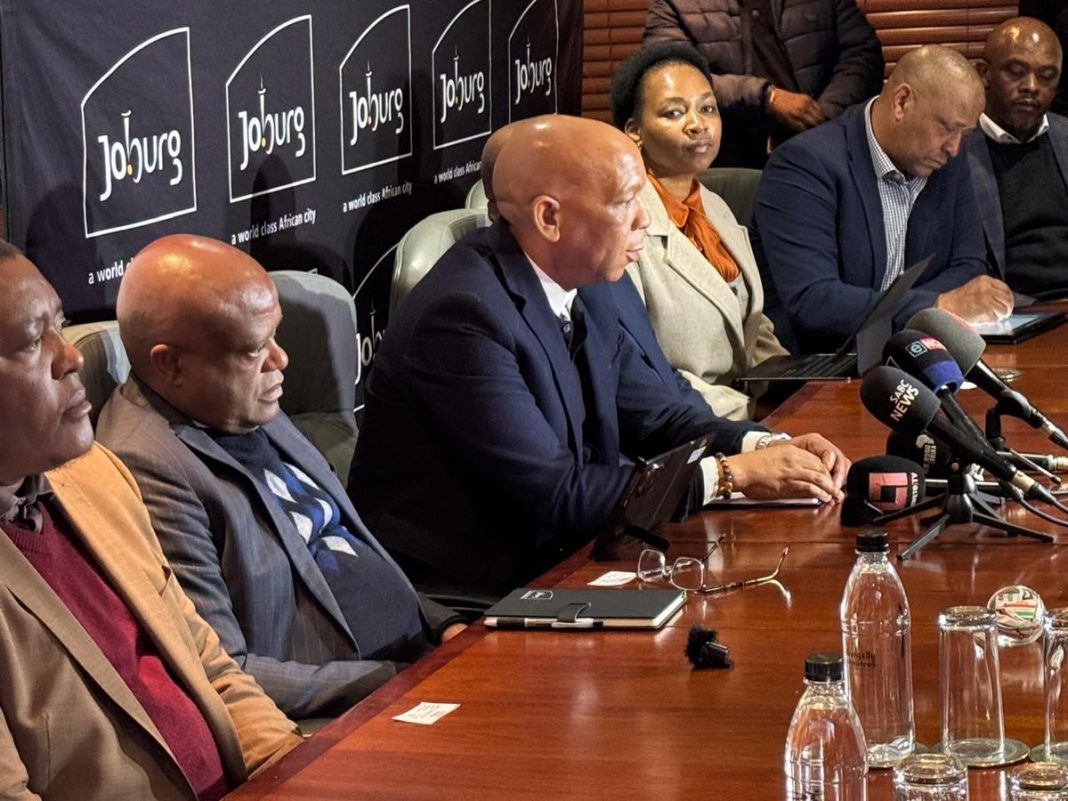By Lungile Ntimba
Electricity and Energy Minister Kgosientsho Ramokgopa, alongside Joburg mayor Dada Morero, announced that City Power has agreed to a structured settlement plan for its R3.2 billion debt owed to Eskom over the next four years.
The billing dispute had the potential to undermine the security of electricity supply to the City of Johannesburg and its residents.
Ramokgopa and Morero made the announcement during a media briefing on Tuesday.
Eskom agreed to write off R830 million, accumulated over approximately ten years, which includes penalties for exceeding notified maximum demand, wheeling charges, estimation adjustments during loadshedding, rebilling, and VAT reversals.
The agreement comes after an investigation by the South African National Energy Development Institute (SANEDI), an independent technical assessor.
SANEDI verified metering data at bulk infeed points, applied Eskom’s approved tariffs, analyzed discrepancies, and compiled a report that facilitated the settlement accepted by all parties.
SANEDI’s report findings confirmed the integrity of the metering systems and identified areas for improved billing practices.
Both Eskom and City Power have since committed to enhanced data-sharing, transparency, and a structured reconciliation of outstanding balances.
Earlier this year, Eskom had threatened to disconnect electricity supply to the City of Johannesburg due to an outstanding bill of R4.9 billion, in addition to R1.4 billion in current charges.
“Johannesburg City Power will pay the R3.2 billion over four years. It’s important that there’s an appreciation that this is a big ticket of R3.2 billion. Of course, that amount has been in dispute. I want to emphasise that City Power and the City of Johannesburg have done everything possible to maintain paying the current account,” said Ramokgopa.
“Despite all these difficulties, of course there will be challenges from one month to the other, but the issue remain in dispute until we resolve this matter.”
Ramokgopa added: “We wanted to give feedback to the rest of the country, on an instrument that we had initiated in November last year to ensure that we bring to bear the power of the Intergovernmental relations and to ensure that service delivery continues uninterrupted. Of course, the expectation is that City Power continues to maintain the current account. We are excited about this development.”
Ramokgopa acknowledged ongoing challenges, pointing out that the structure of the electricity tariff system was a key contributing factor— one that is not unique to Johannesburg.
He explained that winter tariffs, particularly under the time-of-use system, place a significant financial strain on consumers, making it harder for households and industries to meet their payment obligations during this period.
Ramokgopa announced that relief measures would be implemented during the winter months – not only to assist City Power but also to support consumers.
“Of course, consumers are paying their current accounts, but we don’t want City Power to redirect those funds to settle arrears. So, we’ve agreed that during the winter period, there will be relief in relation to the R3.2 billion debt,” he said.
Morero conceded the difficulties encountered during the negotiations but commended the collaborative effort that led to a fair agreement.
The mayor also thanked Ramokgopa for his leadership in the process to ensure security of electricity supply to the residents of the Johannesburg.
“As the City of Johannesburg, we would like to express our sincere appreciation to Minister Ramokgopa for his commitment to get us to where we are today. The process we undertook from November, had its own challenges but we want to acknowledge the work put in place to ensure we arrive at a settlement. City Power and Eskom are happy with the settlement as outlined by the Minister. It is now a matter of implementing the agreement,” said Morero.
SANEDI CEO, Dr Titus Mathe thanked Eskom, City of Johannesburg and City Power for their cooperation and commitment to a stable and transparent billing process.
“I think in the report, we captured that there was a break in communication and so we are recommending monthly bilateral meetings, which were there before but were discontinued. We urge the parties to continue the data sharing protocol and that is something that will help to address the challenges,” said Mathe.
Eskom and City Power further agreed to work on other infrastructure challenges that lead to load reductions such a vandalism and theft of infrastructure to minimise electricity loses.
The two parties have also put in place protocols to deal with estimates.
INSIDE METROS

